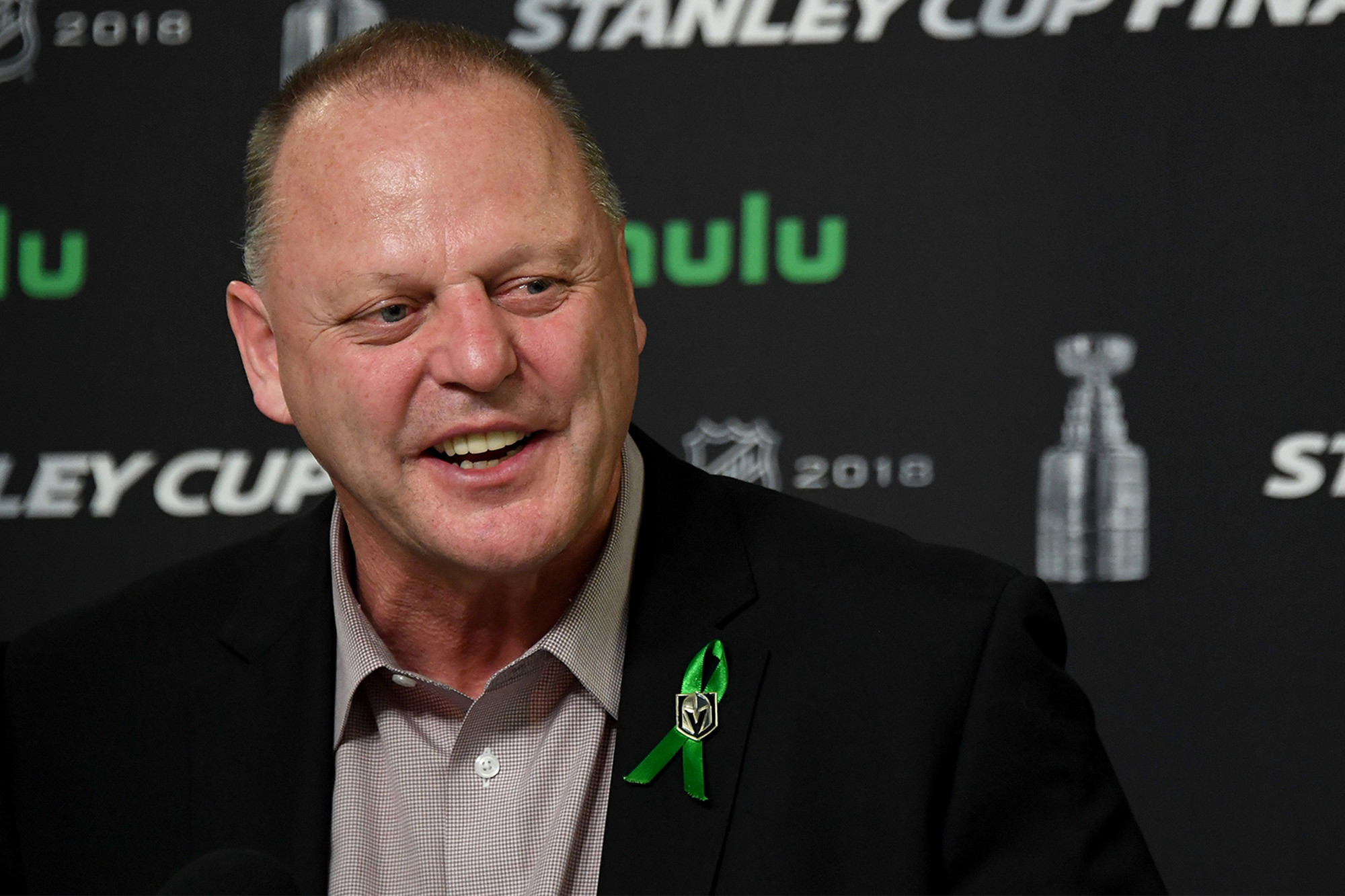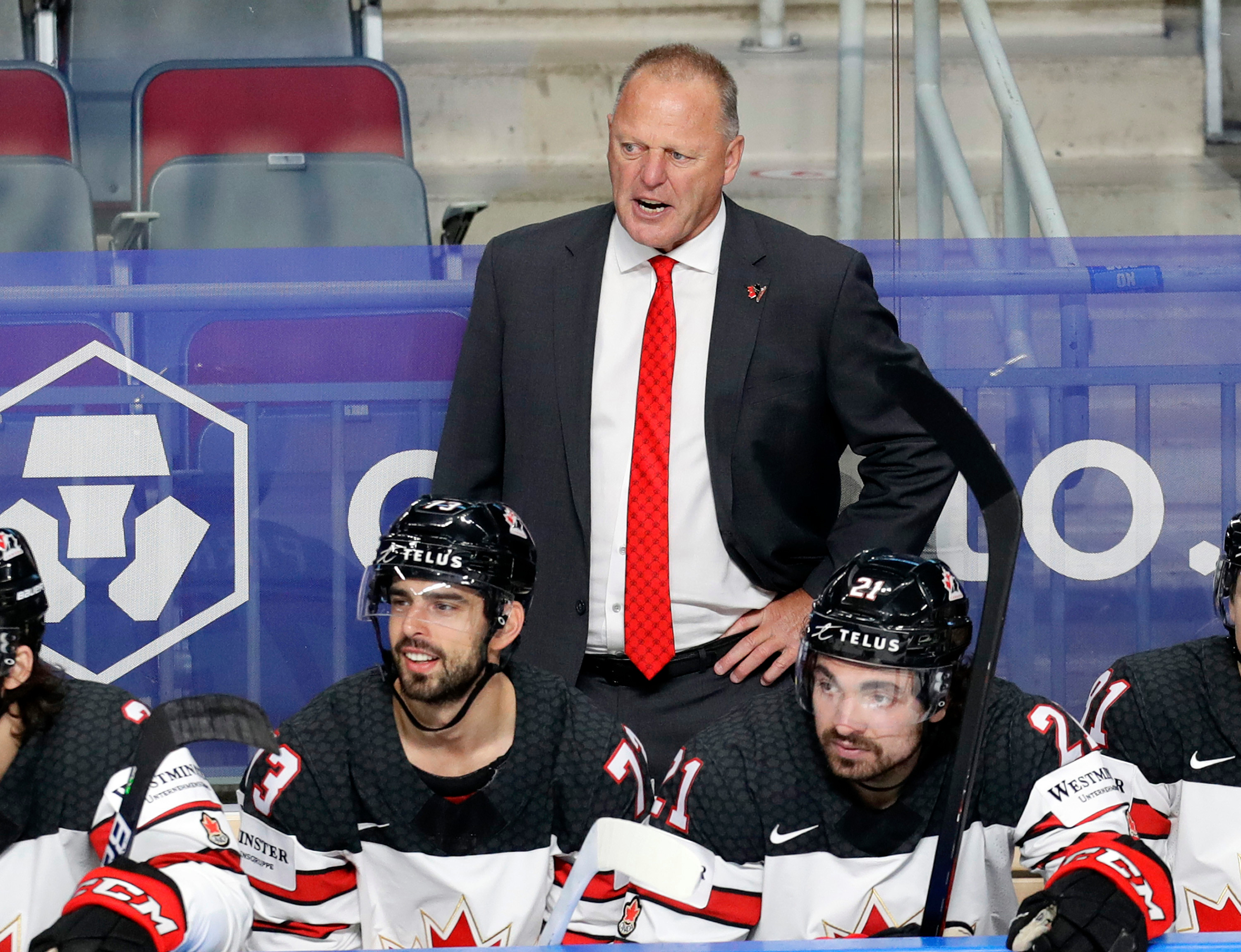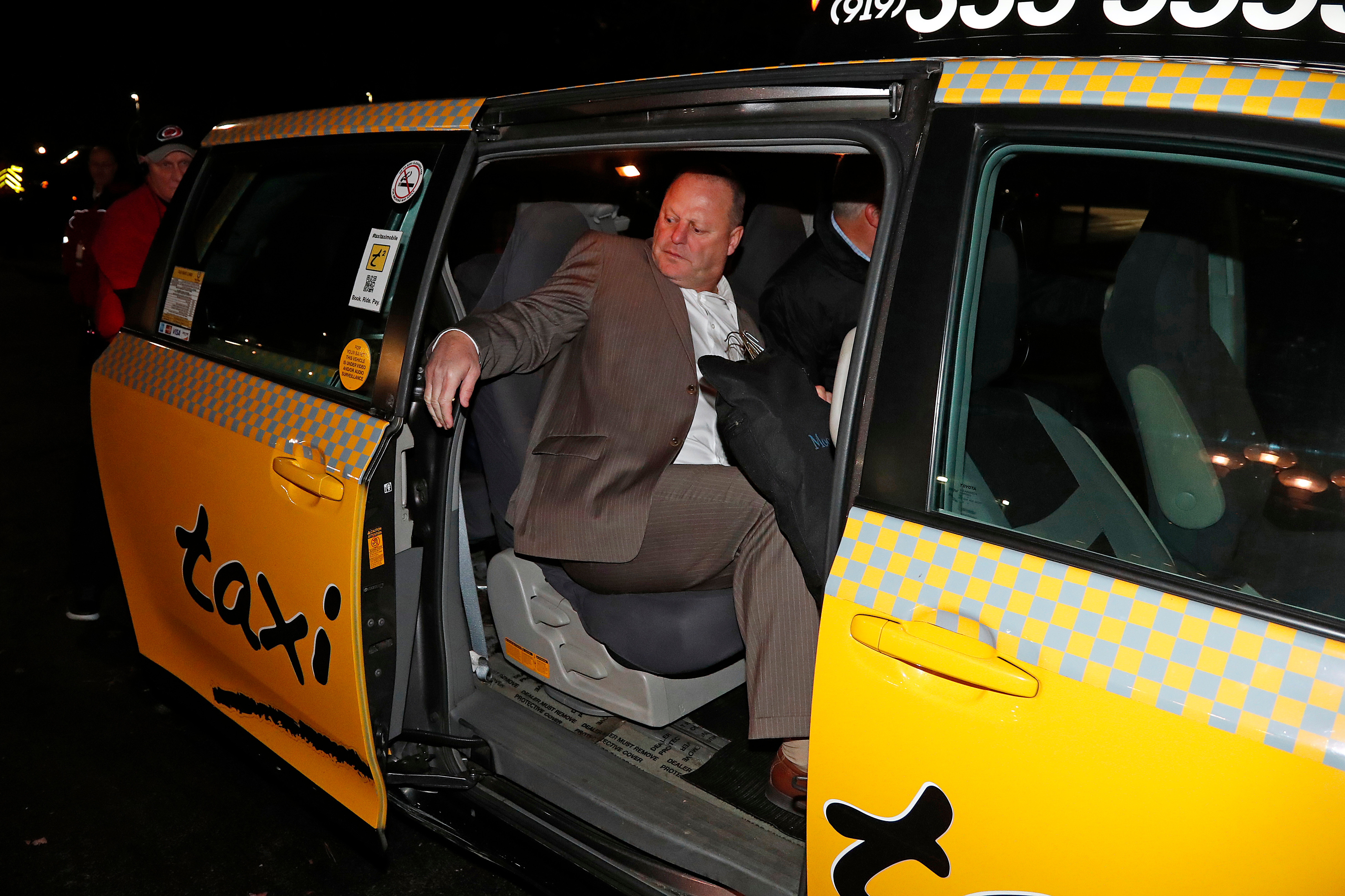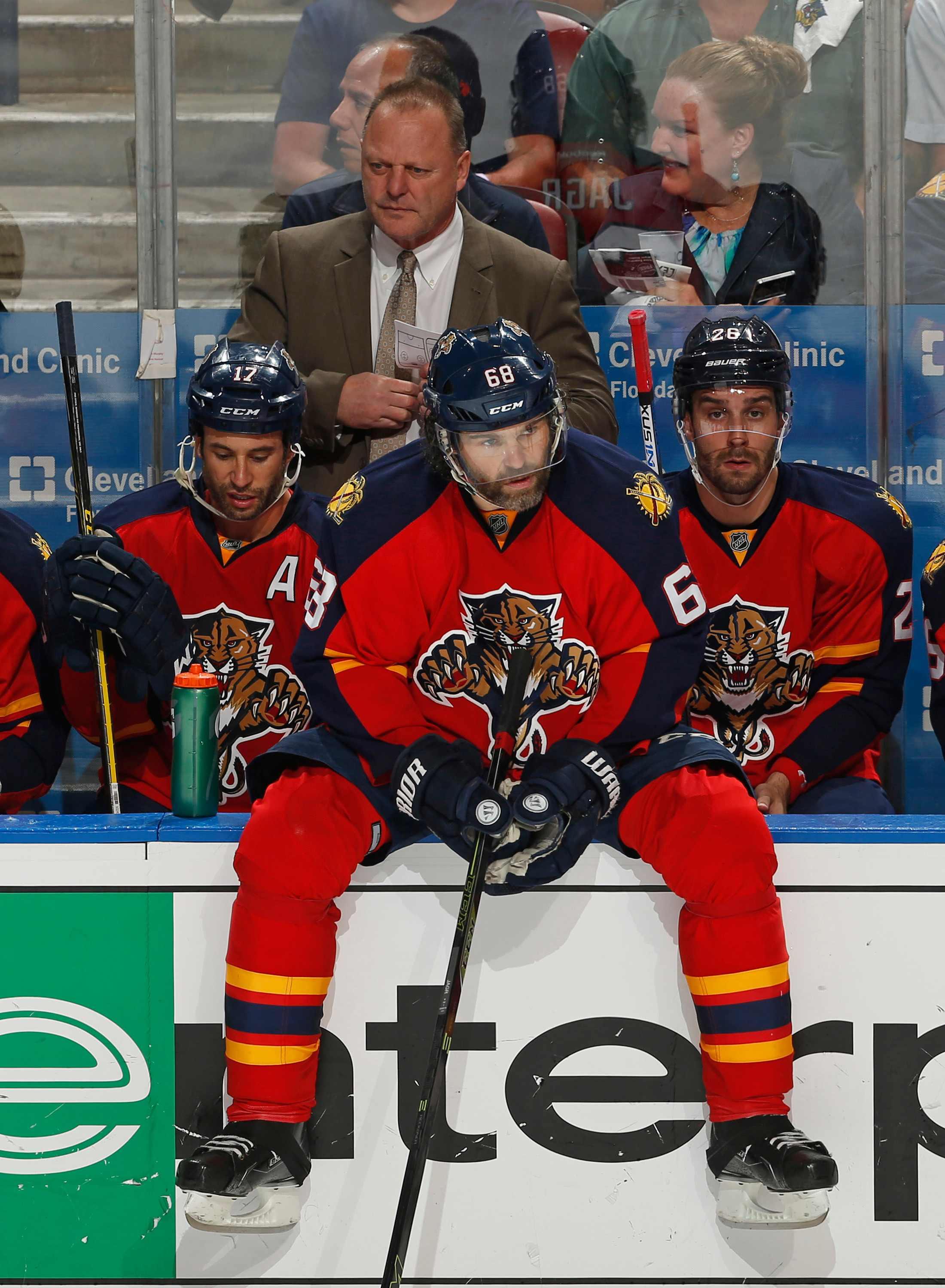More On: gerard gallant
Rangers add two assistants to Gerard Gallant’s staff
New Rangers coach Gerard Gallant is craving the Stanley Cup
The one thing from Gerard Gallant’s Rangers intro that didn’t make sense
Gerard Gallant makes his Rangers mission crystal clear
Gerard Gallant is ideal choice to solve star issue that haunted Rangers
New Rangers coach Gerard Gallant takes a timeout for some Q&A with post columnist Steve Serby.
New Rangers coach Gerard Gallant takes a timeout for some Q&A with post columnist Steve Serby.
Q: What would you say drives you?
A: Well, I want to win a Stanley Cup. I never [have] won a Stanley Cup. I enjoy the game, I still have a lot of fun coming to the rink, and I got two grandboys, 4 and 5 years old, and they’re pretty happy to see grandpa coaching an NHL hockey team. They’re at that age where they’re starting to watch the highlights and all that. They remember Vegas [2017-20] a little bit, but now they’re at a perfect age, and they’ll watch those highlights every night, so I’m looking forward to that.
Q: Tell me about your Stanley Cup dream as a kid.
A: It goes back to those days, every day you’re playing in the driveway and hope you’re playing for the Stanley Cup. I was fortunate enough to get a chance to be close to ’em as a player, and even closer to it with Vegas in the finals. I obviously had a couple of parties with it with the Red Wings when they won after I was done playing with them. It was enjoyable, but it’s still not the same until you win one yourself.
Q: Did they let you drink out of the Cup?
A: They wanted me to, but I didn’t. You’re not supposed to touch it unless you win it, so I just had the party and it’s fun, but I never drank out of it.

Q: How good of a coach do you believe you are?
A: Well, there’s 32 coaches in the NHL, and I’m just trying to be one of those coaches, get our team ready to play. I take a lot of pride in my team being the hardest-working team on the ice. I don’t care if I’m the worst coach or the best coach in the NHL, it’s just about us winning and being ready as a team to play. You get judged by your wins and losses, but I don’t really care what people think if I’m the best coach or the worst coach in the league, it’s just you come do your job, you have fun at it, try and get as many wins as you can, and the ultimate goal is to win a Stanley Cup.
Q: Describe your ideal hockey player.
A: A guy that comes to work every night, shows up to play 60 minutes as many nights as he can 82 games a year, and I love seeing a guy that can play a 200-foot game. He plays hard, he’s good offensively, he’s good defensively, he can stand up for himself. You don’t gotta do everything great, but do everything good. That’s a great hockey player for me.
Q: If a team takes on the personality of its coach, what would you want this team’s personality to be?
A: Very competitive. Again what I just described as a hockey player, that’s the way I tried to play every game. So being ready to play every night. But, come to work and be ready to work. My goal, ever since I’ve been a coach and a player is I’m in the NHL, the best league in the world — let’s have fun every day, but let’s work hard every day and keep it fun.
Q: Will the word abrasive fit this team?
A: That’s a good word. You watch the playoffs now, and I think every coach knows you have to have some guys that are ready to be abrasive. You can’t have every player doing that, obviously, that’s not the NHL today, but you gotta have every player standing up and competing for themselves and playing hard. … But abrasive’s a great word.
Q: As a player, you would get into scraps early in games.
A: The NHL back then there was a lot more fighting, and I found I played a lot better hockey when I got involved early in physical play. Back then there wasn’t a whole lot of numbers and analytics, but I found when I fought in the first period, I always scored that game, a good portion of the time I scored.
Q: You were 5-foot-10, 190 pounds, but you weren’t afraid of anybody.
A: I wasn’t scared of anybody. It’s just the way you were brought up, when you’re from a big family. I enjoyed the fighting part of that game in that era. Sometimes you bit off a little more than you can handle, that was OK, ’cause you never got hurt back then.
Q: How do you motivate?
A: You know what? It’s part of the game now, you get guys ready to play. But honestly, I think what’s really important for me is you have your good veteran players, your leadership guys. I don’t think a coach should have to come in there and motivate players. For me it’s about having great leadership in your locker room, and they take control of your locker room, and I think that’s a big part of motivation. We prepare every day, we prepare for practice and get the team ready, and I think the players and the leadership take over from there.
Q: What is playing the game the right way?
A: You can’t have 13 guys who play real good defensive hockey … and seven guys who are gonna be your offensive players. Good teams take 20 players to win any given night. You gotta be working defensively, you gotta be working hard offensively, and I think the good teams all do that. I don’t think you can say, “Well we got an offensive team here.”
Q: What won’t you tolerate?
A: I don’t like undisciplined hockey. I like to play a hard game and a physical game, but I don’t like to see guys taking undisciplined, unsportsmanlike penalties. And to be honest with ya, I won’t be satisfied if I’m watching guys not working hard on the ice, that’ll be the biggest thing for me. You can work hard for 45 seconds and you can rest on the bench. The big thing for me is when you’re on the ice, if you don’t got the puck, let’s go get the puck. Let’s work hard the 45 seconds, then you can change and you can rest for a minute-and-a-half so. … I don’t like lazy hockey players.
Q: What’s your No. 1 rule?
A: Respect’s a big word for me. We’re gonna respect our players, we’re gonna respect our organization, all the people that work in the organization. That’s really important to me. That starts from the top with our group. It’s not gonna be allowed that you’re gonna be late for practice, you’re gonna be late for this — we’re not gonna stand for that. So, respect everybody’s time and let’s have some fun. I don’t like to put a whole lot of rules in place, but I like people to respect each other, and respect your teammates, and respect the people you work around every day.
Q: Who are leaders you admire?
A: The one I’ve been around a lot as a player was Steve Yzerman. … Obviously there’s a Mark Messier with the Rangers. … And then a leader don’t gotta be guys that are talking all the time. Leaders lead by example on the ice, that’s what’s important.

Q: What do you remember about Messier and that ’94 championship Rangers team?
A: I remember Messier from playing against him before that, in the ’88 and ’89 playoffs when we were in the semifinals when I’m with Detroit. Just the way he came and played every night and showed his leadership and character. Good person, competes every night. He made that Ranger team go, obviously. He took control of that series — New Jersey [in the conference finals], obviously. He was a great leader, and he came to play and he backed up his words. He showed it on the ice every night.
Q: What is your definition of toughness?
A: In today’s game in the NHL, you can compete, you can battle hard, you go win the puck battles in the corner, you’re first on pucks, you’re not waiting for the other team to get the pucks. Toughness isn’t all about fighting, it’s about winning those puck battles and getting to pucks first.
Q: When you watched the May 3 Artemi Panarin incident, when Tom Wilson injured him, what was your gut reaction?
A: I just didn’t like it at all. I didn’t think it should have happened. You’re not gonna go over the whole incident, but I liked the way the Rangers responded to it. Tom Wilson’s a tough hockey player, every team would love to have that type of hockey player, but you can’t allow that to happen.
Q: Who are coaches outside hockey you admire?
A: The San Antonio coach, [Gregg] Popovich. I like the way he handles himself, he carries himself. He’s been a winner. He’s been in San Antonio for a long time, and it looks like he enjoys what he does.
Q: After you were surprisingly fired by the Panthers, there was an infamous photo of you tracking down a cab. What was that like for you seeing that photo?
A: It was actually funny two weeks later when I saw the photo. The whole thing about that is, too, that got blown way out of proportion. The taxi was driving by, I was sick of waiting for the town car to come, so me and my assistant coach Mike Kelly, I said, “Flag that taxi over, let’s jump in that.” It just happened to be there was a bunch of people out there taking pictures and everything.

Q: Who are athletes outside hockey you admire?
A: I’ve always liked baseball. I was a big Yankee fan when I was a kid growing up. I was always a Ron Guidry fan, a Don Mattingly fan, the Yankees back in that time, Reggie Jackson fan. Obviously I did admire Michael Jordan and those guys for what they’ve done.
Q: What drew you to the Yankees?
A: Back then, there was no Canadian teams, I think the Expos were starting. … They were like the Montreal Canadiens, they were winning, so I wanted to pick the winner at that time. But it was fun watching Reggie Jackson because he was hitting all those home runs at that time. I just liked the makeup of the team. Thurman Munson was a guy that I really liked, good catcher, played hard.
Q: What made Steve Yzerman so special?
A: He wanted to be a special player. He worked really hard in the offseason. He competed every day. Early in our career, when we were a real bad team in Detroit, we didn’t have much of a chance to win, and that really bothered him and he just wanted to get better every day. Early on he was a star offensive player, but when he became one of the best players in the league — he was blocking shots, he was killing penalties, he was doing all the little things — and that’s when they started winning their Stanley Cups. So his game changed a little bit, but that’s just the way Stevie was, whatever it took to win that’s what he did.
Q: Whatever comes to mind: Bob Probert?
A: Toughest guy ever. Great friend.
Q: Mike Keenan?
A: Good coach. Tough-ass coach.
Q: Brian Leetch?
A: Unbelievable skills, great all-around player.
Q: Billy Smith?
A: Scored my first goal against him … competitor … battler.
Q: Jacques Demers?
A: Great coach for me, I had my best four seasons under Jacques Demers … emotional guy … fiery guy … great man.
Q: Chris Drury as a player?
A: Good, solid two-way hockey player.
Q: Jaromir Jagr?
A: Unbelievable player. Great person. I enjoyed my three years with Jagr in Florida.
Q: Describe your emotions leaving the Red Wings as a player in 1993.
A: Real tough. I mean, I was there nine years, drafted by them, and when it was time for me to go — I was a free agent and I knew they didn’t want me back — so it was a real, real tough day. At that time, I would have taken any contract they would have offered me even though I got a pretty good deal with Tampa Bay, but … it was the toughest day of my life that time.
Q: Describe coaching the QMJHL Saint John Sea Dogs.
A: That was three outstanding years [2009-11], we had the top team in Canada for three years in a row, and it was fun to coach. There were nights we knew we were gonna win by seven or eight goals. It was too easy at times. I was happy when we lost once in a while because our kids were so talented, so you could get them a little hard work at practice the next day.
Q: Why was Mike Bossy one of your boyhood idols?

A: He was one of the best scorers of all time, and back then when I was a kid growing up in PEI [Prince Edward Island], they [the Islanders] had a real good team at that time obviously with Bossy, [Bryan] Trottier, [Clark] Gillies and all those guys, and we had a guy from PEI, [Billy] MacMillan, that played on the team also, so I cheered for them, and I wanted them to beat the Montreal Canadiens because Montreal was so good back then, when a team finally beat Montreal I was happy. I always cheered for the team that could beat Montreal.
Q: What stood out to you about Bossy?
A: Just his goal scoring. He could score from anywhere he’d shoot the puck. When you’re playing roller hockey, I was either Trottier, Bossy or Gillies — that was my favorite line back at that time in that era, and he was just a guy that scored all the goals.
Q: Why did you wear No. 9 in Juniors?
A: Bobby Hull and Gordie Howe were my favorite players as a kid growing up, and I always liked the No. 9. Obviously when I got to play at Detroit, I wasn’t getting No. 9.
Q: What was it like growing up as one of 11 children?
A: That was a lot of fun, there was always people around, brothers and sisters playing roller hockey. We grew up in a small town, and you knew everybody in the town. We always got what we needed, money and everything wasn’t important, but you enjoyed what you were doing. It was fun running around the dinner table trying to get something to eat.
Q: Which number were you of the 11?
A: I was nine.
Q: Who started calling you “Turk”?
A: One of my older brothers, I don’t even really remember when it started. I was 2 or 3 years old, my uncle had a clay basement, I used to go down to his basement. He raised turkeys, so I used to chase ’em in the basement.
Q: Three dinner guests?
A: I enjoy my buddies. I come home every summer and I got eight buddies that I grew up with and eight buddies that I play poker with every weekend. They’re as good as anybody.
Q: Eight dinner guests then?
A: Exactly.
Q: Favorite movie?
A: “Shawshank Redemption.”
Q: Favorite actor?
A: Clint Eastwood.
Q: Favorite actress?
A: Sharon Stone.
Q: Favorite singer or entertainer?
A: Shania Twain. Favorite band’s AC/DC.
Q: Favorite meal?
A: I’m a steak and potatoes guy.
Q: Message to Rangers fans?
A: We’re gonna be a very competitive team, and you know what? We’ll do the best we can. And cheer loud! They’re a big part of what we’re gonna do.
This story originally appeared on: NyPost - Author:Steve Serby






















